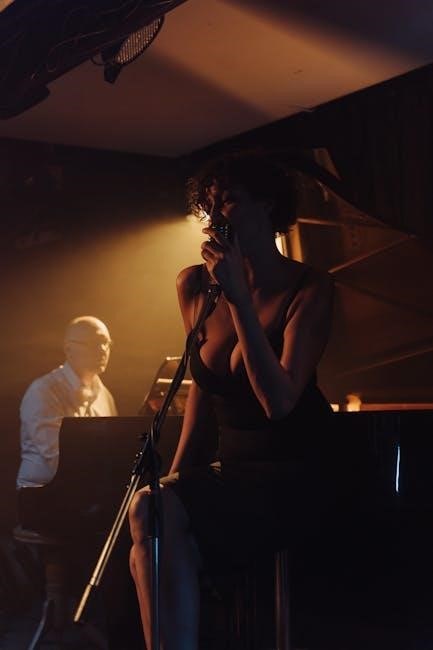Discover the enchanting world of Oz through the Wicked musical script, a captivating tale of friendship, morality, and self-discovery. This script reveals the untold story of Elphaba, the wicked witch, offering a deeper understanding of her journey and the iconic characters surrounding her. With its rich dialogue and emotional depth, the script provides a unique perspective on the beloved Wicked story, making it a must-read for fans and theatrical enthusiasts alike.
1.1 Overview of the Musical and Its Significance
The Wicked musical script, based on Gregory Maguire’s novel, reimagines the Oz narrative, focusing on the untold story of Elphaba, the future Wicked Witch of the West. This Broadway sensation, with music and lyrics by Stephen Schwartz, explores themes of friendship, prejudice, and the complexity of morality. The script delves into Elphaba’s journey, her rivalry-turned-bond with Glinda, and the political turmoil of Oz. Its significance lies in its fresh perspective on classic characters and its thought-provoking commentary on societal judgment. The musical has become a global phenomenon, praised for its stunning visuals, powerful music, and emotional depth, captivating audiences worldwide and cementing its place as a modern theatrical masterpiece.
1.2 Importance of the Script in Understanding the Story
The Wicked musical script is essential for fully grasping the narrative’s depth, character motivations, and thematic complexity. It provides a detailed blueprint of the story, revealing the emotional journeys of Elphaba and Glinda, and their evolving relationship. The script highlights key dialogues and scenes that shape the plot, offering insights into the characters’ inner conflicts and the moral dilemmas they face. By examining the script, audiences can better understand the musical’s exploration of prejudice, friendship, and the nature of good and evil. Additionally, it serves as a valuable resource for analyzing the storytelling techniques and artistic choices that make Wicked a compelling and thought-provoking production.

Where to Find the Wicked Musical Script PDF
The Wicked musical script PDF can be found in Wicked: The Grimmerie or through official licensing sources like Music Theatre International when available.
2.1 Official Sources and Publications
Official sources for the Wicked musical script PDF include Wicked: The Grimmerie, which offers a partial version of the script. This publication provides a detailed look into the musical’s narrative and production, making it a valuable resource for fans and researchers. Additionally, official licensing companies like Music Theatre International (MTI) manage distribution rights for theatrical performances, ensuring authenticity and legality. While the full script is not widely available to the public, these official channels offer reliable access to the material, supporting both academic study and professional productions of Wicked.
2.2 Availability Through Licensing and Retail
The Wicked musical script PDF is available for purchase through retail platforms, offering both printed and digital formats. Licensing rights, managed by Music Theatre International (MTI), are currently limited, with exceptions for certain regions like Australia. This ensures that only authorized productions can use the script, maintaining its integrity. Retail options, such as the Wicked: The Grimmerie, provide partial scripts, while full versions are reserved for licensed performances. This balanced approach supports both fan engagement and professional theatrical use, ensuring the script remains accessible while protecting its intellectual property. Retail purchases are ideal for collectors and researchers, while licensing caters to theatrical groups seeking to stage the musical.

Key Scenes and Dialogues in the Script
The Wicked script captivates with iconic scenes like “I’m Not That Girl” and the final confrontation, showcasing emotional depth and complex character dynamics through powerful dialogue and storytelling.
3.1 “I’m Not That Girl” Scene Analysis
The “I’m Not That Girl” scene is a poignant moment in the Wicked script, showcasing Elphaba’s emotional depth and self-awareness. The dialogue highlights her internal struggle with unrequited feelings, as she acknowledges the impossibility of her relationship with Fiyero. This scene is crucial in defining Elphaba’s character, illustrating her strength and resilience. The lyrics are rich with poetic imagery, capturing the complexity of her emotions and the harsh realities she faces. This powerful dialogue not only advances the plot but also deepens the audience’s connection to Elphaba, making it a memorable and emotionally resonant moment in the musical.
3.2 The Final Confrontation and Ending
The final confrontation in Wicked is a climactic moment of emotional depth and resolution. Elphaba, realizing the truth about her past and the loss of her father, confronts the reality of her isolation. Her desperate plea, “There’s no place like home,” underscores her longing for connection and belonging. The Ozians’ chilling chant, “No one mourns the Wicked!” heightens the tension, leading to Elphaba’s heart-wrenching scream. The ending masterfully ties together the themes of sacrifice and misunderstanding, leaving the audience with a profound sense of empathy for Elphaba. This conclusion not only completes her journey but also sets the stage for the events of The Wizard of Oz, providing a haunting closure to her story.

Character Development in the Script
The Wicked script masterfully explores complex character arcs, particularly through Elphaba and Galinda, showcasing their evolving relationship and individual growth. Their dynamic shifts from rivalry to deep understanding, highlighting their shared struggles and ultimate sacrifices, creating a rich emotional landscape that defines the story.
4.1 Elphaba’s Journey and Transformation
Elphaba’s journey in the Wicked script is a compelling exploration of self-discovery and transformation. Initially portrayed as an outcast due to her green skin, she evolves from a misunderstood individual to a powerful leader. Her relationship with Galinda challenges her perceptions, while her unwavering commitment to justice drives her decisions. Key moments, such as her defiance of the Wizard and her iconic declaration of independence in “Defying Gravity,” highlight her growth. The script also delves into her vulnerabilities, like her unrequited love for Fiyero and her tragic confrontation with Nessarose. Elphaba’s transformation from an isolated student to the “Wicked Witch of the West” is both poignant and inspiring, making her one of Broadway’s most complex characters.
4.2 Galinda’s Role and Relationship with Elphaba
Galinda, later known as Glinda the Good Witch, plays a pivotal role in the Wicked script, serving as both a foil and a companion to Elphaba. Initially portrayed as shallow and self-absorbed, Galinda’s character evolves, revealing her insecurities and genuine desire for acceptance. Her relationship with Elphaba begins with rivalry but gradually transforms into an unlikely friendship. The script highlights their contrasting personalities and the mutual influence they exert on each other. Galinda’s eventual support for Elphaba, despite societal expectations, underscores her growth and the depth of their bond. Their dynamic adds complexity to the story, showcasing themes of friendship and loyalty amidst adversity.
Themes and Messages in Wicked
Wicked explores profound themes like the nature of good and evil, friendship, and sacrifice, challenging perceptions and highlighting the complexity of human choices and relationships.
5.1 The Nature of Good and Evil
The Wicked musical script delves into the complexities of morality, challenging traditional notions of good and evil. Elphaba, often perceived as the wicked witch, embodies a deeply nuanced character whose actions are driven by love, loyalty, and a desire for justice. Her journey highlights the gray areas between right and wrong, showcasing how circumstances and perspective shape moral judgments. Meanwhile, Galinda’s transformation underscores the fluidity of these concepts. The script invites audiences to question their assumptions, emphasizing that true evil often stems from fear, prejudice, and the suppression of truth. This theme resonates powerfully, encouraging empathy and self-reflection in understanding the duality of human nature.
5.2 Friendship and Sacrifice
The Wicked musical script beautifully portrays the transformative power of friendship and sacrifice. Elphaba and Galinda’s relationship evolves from rivalry to deep trust, with pivotal moments like Galinda supporting Elphaba during her wheelchair journey. Their bond is tested when Elphaba sacrifices her own happiness to protect those she loves, showcasing the strength of true friendship. The script highlights how these characters prioritize each other’s well-being, even in the face of adversity. The emotional depth of their dynamic underscores the enduring power of loyalty and the profound impact of selfless acts, leaving a lasting impression on audiences and enriching the story’s emotional landscape.

Stage Production and Adaptation
The Wicked musical script is renowned for its technical brilliance and theatrical innovation. Its stage production features elaborate sets, flying sequences, and stunning visual effects, creating an immersive experience. The adaptation process ensures the script’s emotional depth and magical elements translate seamlessly to both stage and screen, captivating audiences worldwide with its timeless appeal and production excellence.
6.1 Technical Aspects of the Musical
The Wicked musical script is brought to life through its extraordinary technical aspects, which include elaborate stage designs, flying sequences, and intricate set changes. The production utilizes advanced machinery to create the illusion of floating characters and dynamic scene transitions. Pyrotechnics, lighting, and special effects enhance the magical elements of the story, immersing the audience in the world of Oz. The technical team ensures seamless execution of these elements, blending engineering with artistic creativity to deliver a visually stunning performance. These aspects are crucial in translating the script’s emotional and visual demands into a captivating theatrical experience.
6.2 Differences Between Stage and Film Adaptations
The stage and film adaptations of Wicked showcase distinct approaches to storytelling. The stage version relies heavily on grand sets, elaborate flying sequences, and dynamic lighting to create the magical world of Oz. In contrast, the film adaptation offers a more intimate perspective, utilizing close-ups and diverse locations to delve deeper into character emotions. While the stage production emphasizes spectacle, the film explores subtle details and expands on scenes not fully realized in the musical. These differences reflect the unique strengths of each medium, providing audiences with two unique experiences of the same beloved story.
Licensing and Performance Rights
Wicked licensing remains limited, with priority given to professional productions. Rights are managed by Music Theatre International (MTI) in the U.S., with a waiting list for amateur groups.
7.1 Current Availability for Theatre Groups
The Wicked musical script is currently unavailable for licensing to most theatre groups, except in Australia. This exclusivity ensures the production’s high standards and popularity. Licensing rights are tightly controlled to maintain the musical’s prestige and technical demands. When Wicked becomes available, it will be distributed through Music Theatre International (MTI) in the U.S. and affiliated companies worldwide. Theatre groups are encouraged to monitor MTI for updates, as availability is expected to expand in the future. This controlled release strategy ensures the musical’s integrity and success across productions.
7.2 Future Prospects for Licensing
The future of licensing for Wicked is promising, with expectations of broader availability as rights expand globally. While currently limited, the musical’s enduring popularity suggests that Music Theatre International (MTI) will eventually open licensing to more theatre groups. This will enable schools, community theaters, and professional productions to bring the magical story of Oz to new audiences. As licensing becomes more accessible, fans can anticipate fresh interpretations and adaptations, ensuring the musical’s legacy continues to grow. Theatre groups are advised to monitor MTI’s announcements for updates on when Wicked will be available for performance rights in their region.

Leave a Reply
You must be logged in to post a comment.